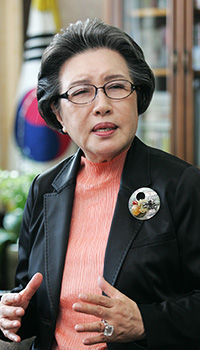
In recognition of her contribution to the national and social development of Korea as a female figure, Kim Tae-lyon, the president of AICOREA (The Foundation for Adults and Infants) received the 18th Yu Gwan-sun Award on March 11, named after a Korean female independence activist.
“It is an honor to receive such an award commemorating a national heroine who sacrificed herself for the nation,” Kim shared.
AICOREA is a public service corporation aiming to promote the rights of the social minorities. Among its various works, the corporation runs Korea Yuk-young School, the very first school established for students with autism and other developmental issues.
Moreover, in order to improve people’s perception on developmentally disabled people, they take part in an international program called “Best Buddies,” which matches a disabled student with a non-disabled student to help them be friends. Kim explained that this provides an opportunity for both to be friends with someone different from them, in a society with relatively less chances for each group to interact with one another. This program also includes a project where the disabled become an ambassador and are trained to speak up their opinions and status internationally in front of the public.
Along with the programs for people with disability, AICOREA also has centers and programs for people of all ages suffering from psychological problems such as depression. The corporation is running various psychotherapy centers according to the social needs of such places for the public welfare.
In addition to its financial and institutional support, the corporation creates textbooks and teaching aids of high quality. Their class materials are evaluated to be great and AICOREA is planning to expand its market abroad to other countries including China.
“Back in the days, even until the 80s, Korea was a country that needed help and support from foreign countries regarding education,” Kim shared. “However, today, we became a nation where foreign countries would like to imitate the programs and procedures we have developed.”
Kim started her career as a psychology professor in 1964 at Ewha Womans University. During the early years of her career, she was the first person in Korea to establish gender psychology as an academic discipline and open relative courses.
“Since only few women were assigned to important positions back in the days, I was curious of the difference between gender,” Kim said. “In order to study such difference, I became the pioneer of gender psychology in Korea and the first president of ‘The Korean Society for Woman Psychology,’ opening up opportunities to discuss such field of study. As I resigned from the position, I invited a male professor as the second president since I thought participation of male professors is needed to promote their study and interest in the new field.”
Her pioneering position was not restricted to the area related to women but also involved developmental psychology. While Korean society did not have much interest in developmentally disabled people, Kim again became the first expert in developmental psychology in Korea.
“Back then, France was one of the countries where developmental psychology was well-studied and our country was willing to have experts educated abroad to develop the field,” she shared. “Ewha, as a university with medical school, psychology major and special education major, was chosen to take the opportunity of sending students to France. Through this program, Ewha established its psychotherapy center as the first Korean university.”
After spending 43 years at Ewha as a professor, she was appointed as the president of AICOREA in 2002 and continues to work on diverse projects to protect social minorities based on her past experience at Ewha.
She lastly shared her next steps. First, to expand the programs of AICOREA and second, to develop new ones regarding the elderly, who are placed in the blind spot of welfare in an aging society.

